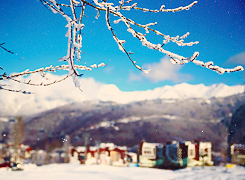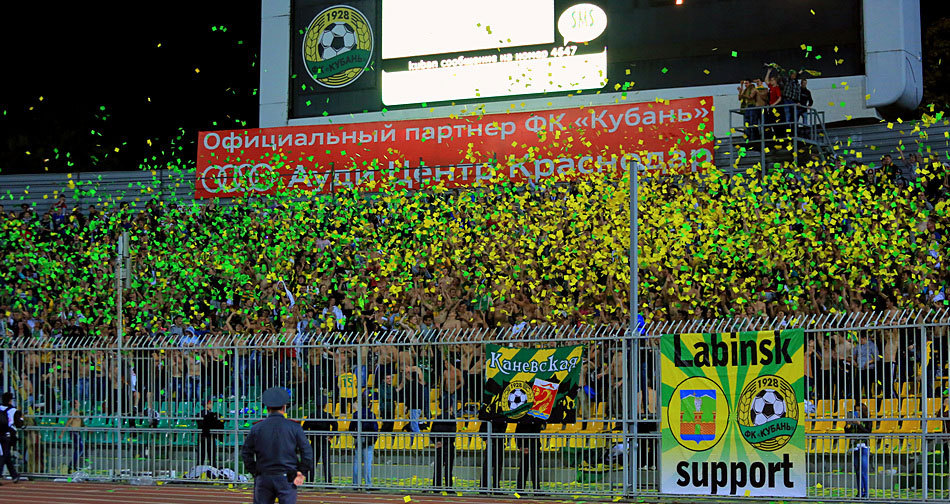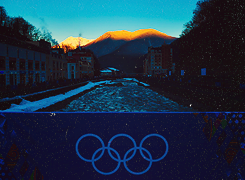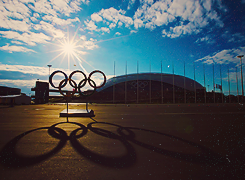The Winter Olympics, Empty Stadiums, and the Redrawing of Russian Football History
The Winter Olympics, Empty Stadiums, and the Redrawing of Russian Football History
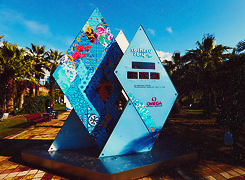
The Winter Olympics, Empty Stadiums, and the Redrawing of Russian Football History
By Domm Norris
More so than any other nation across Europe, politics is a powerful beast in Russian society, and its influence has had a significant impact upon the way in which football has evolved throughout the post-Soviet era. Recent reports of political strength may have been focused on the Black Sea, but such developments also look set to inflict further lasting damage upon the face of football. Kuban Krasnodar are currently under the spotlight as reports surface of a radical reshaping of football in the city, which is as much about filling expensive voids in far-off locations, as working to protect the future of one of the country’s most beloved clubs.
Kuban are the club of Krasnodar. Even though they may currently sit numerous places below their city rivals, FK Krasnodar, the yellow and green portion of the city far outweighs that of Sergei Galitsky’s increasingly expensive ensemble. Kuban are one of the oldest football clubs in the professional game – formed in 1928 – and despite their persistent name changes during the Soviet era, have been a constant in Russian football ever since.
This is a club that has defined football in the city of Krasnodar, an age old institution that deserves to exist in the guise that so many have come to recognize and others have come to love.
The idea that a club of Kuban’s history and stature can simply be forced to move from their natural home to one almost 200 miles away, in the city of Sochi, is a sad expression of the politicization of Russian football. The government have long held an ambition to push forth the perception of Sochi as a fashionable holiday resort, alongside the idea that it is to become the new home of domestic sporting achievement. And despite popular resistance, they are fully intent on seeing their dreams realized.
Sochi has famously come to the attention of the world thanks to this year’s Winter Olympics, which was controversially given to the city despite a stream of disgust and hostility surrounding the decision. The Russian government recognised that such a victory was a perfect opportunity to push forward with their plans to place Sochi at the forefront of Russian sport. Russia, as witnessed recently in Crimea, is prone to acting and enforcing change whenever it senses the slightest whiff of an opportunity, and the government always acts forcefully.
It was always known that the Winter Olympics, as with most international events, would leave a string of expensively assembled facilities vacant as the hundreds of valiant competitors return to their home lands basking in the glory of their feats. There are few measures currently in place to ensure that the ‘legacy’ of the games is felt for generations to come, particularly in a sporting sense. The FIsht Olympic Stadium cuts a lonesome figure as it waits for the Confederations Cup to arrive in 2017, ahead of the World Cup the following year. It’s a hollow, state of the art arena that currently sits idly as the drama of the Winter Olympics begins to fade into memory.
For such a valuable piece of stadia to go under used is an issue that the government are all too aware of. The use of the $779m arena in the World Cup means that there is a strong desire to see a prominent football club make the Olympic Stadium a permanent home in order to capitalize on the feverous atmosphere that will surround the sport. Despite the history underlining the club, it seems as though Kuban Krasnodar are the club that the government are intent on pushing away from their home of old.
The structure of Russian football is built upon particularly precarious foundations, where monetary wealth stems from the backing of power hungry oligarchs and - in the case of Zenit St Petersburg - oil companies. The rest are left to fend off the scraps of state backing and woefully inadequate sponsorship deals which can often be forced upon large corporations by Vladimir Putin – see Tom Tomsk’s financial plight a couple of years ago for an example of this.
Kuban find themselves before a loaded gun in a situation where their financial feasibility could be guaranteed by the government. However, they’d be forced to take up residence in Sochi - it’s something of a painful catch 22. The club have been forced to watch their city rivals, a side who are merely 6 years old, rise to prominence with the backing of seemingly endless funds. The fact that such cash reserves have enabled FK Krasnodar to plant the seeds of longevity – in the form of various indoor facilities aimed at providing accessibility to local talent – has been looked upon favourably by those in government. Galitsky is quickly becoming the apple in the eye of the powers that be – and the construction of a state of the art stadium and training facility is only heightening the sense that FK Krasnodar are a club reaching for the highest possible standards.
Sergei Mutko, Russia’s sports minister, has already publicly stated his desire to see the revival of Zhemchuzhina-Sochi – the name of the city’s former club who buckled beneath the weight of financial mismanagement in 2012. Mutko is the mouthpiece of Putin’s administration, and by forcefully expressing his hopes to ‘revive the tradition’ of football in Sochi, he has ultimately put the history of one of Russia’s most prized clubs beneath the guillotine and is waiting for the opportune moment to chop off its head.
It’s also important to note that Kuban are a club who have, over recent seasons, been one of the most vociferously supported clubs in the country. The past two seasons have seen the club enjoy the highest average attendance, ahead of the likes of Zenit St Petersburg and Spartak Moscow, and while this season’s poor performances has led to a fall in their previously impressive figures, this is still a club that attracts more supporters to the ground than any of the supposed big hitters from Moscow. Last season FK Krasnodar averaged 9,000 fewer fans than Kuban, despite playing in the same stadium, showing how intrinsically entwined the latter are in terms of their association with the Krasnodar public – ahead of a club who remain deeply rooted in their infancy.
It seems as though the fate of Kuban Krasnodar will further pollute the purity of Russian football. The desire to monetise football clubs in areas that can benefit the government, more so than the football club itself, shows just how intrinsically rotten the game has become. The Soviet era may not have been the perfect hotbed of stability for many clubs – with name and location changes relatively frequent – but the apparent destruction of Kuban Krasnodar’s sovereignty is a kick in the teeth for those who have supported the club over the past 86 years.
This piece was written by Domm Norris, an expert on all things Russian football. You can follow him on Twitter at @dommnorris. Comments below please.

